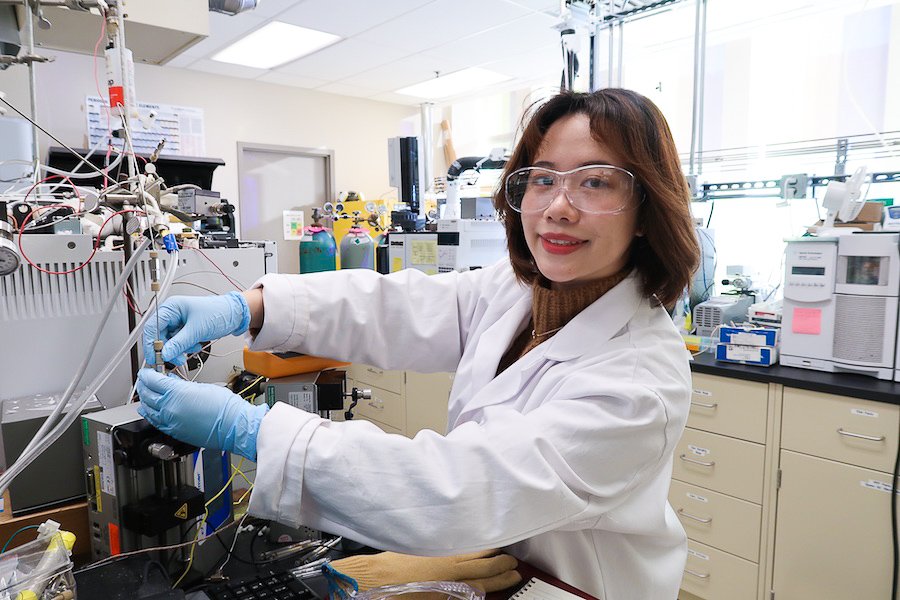Yutong Pang’s secret to finding sustainable solutions

Photo credit: Yutong Pang
CSE grad student plays key role in eco-friendly startup technology
December 7, 2021
There’s a secret to making acrylic acid out of corn, and last year, College of Science and Engineering Ph.D. student Yutong Pang found it. She’s been working on this problem for nearly four years—ever since she joined chemical engineering professor Paul Dauenhauer’s laboratory during her first year on the University of Minnesota Twin Cities campus. The chemical process she discovered was recently patented and led to the formation of Låkril Technologies, a new startup Dauenhauer co-founded this year, to convert lactic acid derived from corn into sustainable acrylics.
Acrylic acid, which is used to make many types of plastics, coatings, and paints, is typically made from petroleum. Researchers have been trying to find a more sustainable way to manufacture it for years.
One way to achieve this is by converting the lactic acid from corn into acrylic acid, which is a particularly tough chemical reaction to achieve because it produces unwanted byproducts. However, Pang discovered the substance that when added to the chemical reaction, was able to suppress that side reaction, paving the way for a more sustainable and economically efficient way to produce acrylic materials.
“Helping the world in reducing its reliance on fossil fuels—and utilizing corn, something we have in the Midwest—is something that really excites me,” said Pang, who received the Pete and Gene Pierce Fellowship and the Lanny & Charlotte Schmidt and Duane Goetsch & Dr. Nancy M. Dickerson Fellowship.
“Right now, the world is thinking about moving in a more sustainable direction,” she added, “and in case one day we actually do run out of fossil fuels, we want to have a solution ready.”
Although she isn’t directly involved in the startup, Pang still got to see her work go from the lab to market. The new technology could potentially provide a 35 percent reduction in carbon dioxide emissions compared to the typical acrylic manufacturing process, and Låkril Technologies was recently chosen as one of six winners of the 2021 National Corn Growers Association’s Consider Corn Challenge III. The local Minnesota Corn Growers Association also supports some of Dauenhauer's corn-related research.
“Yutong's brilliant insight and determination to this problem help us make a giant leap forward beyond existing chemistry and into the realm of economically viable sustainable materials,” Dauenhauer said. “Her work will transform the methods by which we manufacture many materials we use every day and ignite a new wave of biorenewable materials in the United States.”
Lab work pays off
Pang, who grew up in southern China, earned her undergraduate degree in chemical engineering from the University of Wisconsin, Madison before coming to the University of Minnesota Twin Cities. She was drawn by the U’s Department of Chemical and Engineering and Material Science, one of the top chemical engineering programs in the country.
“The program is so big, and I like that it combines chemical engineering and materials science,” Pang said. “I see a lot of collaborations between faculty members here, and I think overall it is a very friendly and collaborative environment.”
“The graduate students are actually enjoying their lives here. We don’t have toxic competition. We like to help each other.”
According to Pang, the department’s graduate student community is very tight-knit. She’s a regular participant in student groups like the graduate division of Society for Women Engineers and Science for All, a science outreach program for local middle schools.
Another big highlight of her graduate experience—the research.
Pang chose the Dauenhauer lab because of her interest in advancing chemical catalysis for sustainable energy and chemical technologies. Last year, Dauenhauer received the MacArthur Foundation’s “genius grant” for developing new technologies to convert biomass into chemicals used in products such as plastics, rubber, and detergents.” Pang said she also valued Dauenhauer’s emphasis on mental health and burnout.
“I very much appreciate how much Paul cares about everyone in the lab,” she said. “He cares a lot about our mental and physical health. When he sees I am stressed or need some time off, he just tells me to take one or two days off.”
“He also gave me a lot of freedom to explore what I wanted to study, which trained me to be a more independent researcher.”
As a research assistant, Pang learned a lot about scientific processes such as characterization, synthesis, kinetic studies, and computation; soft skills like leadership and communication; and the commercial viability of research. And, she’ll put all of this knowledge to good use when she graduates in summer 2022 and starts a job in research and development at the Dow Chemical Company. There, she’ll help companies find solutions to chemical problems and make their processes more efficient.
“The U of M’s program has prepared us all very well in terms of the fundamentals of chemical engineering,” Pang said. “The coursework is on the difficult side, but the faculty really care about whether we understand it, so that lays a very solid foundation. And the technical and soft skills I gained from working in the Dauenhauer research group have prepared me to be a better scientist. I am ready to find solutions to ongoing sustainability challenges.”
To learn more about Låkril Technologies, read the startup’s press release.
Story by Olivia Hultgren
If you’d like to support students in the University of Minnesota College of Science and Engineering, visit our CSE Giving website.
